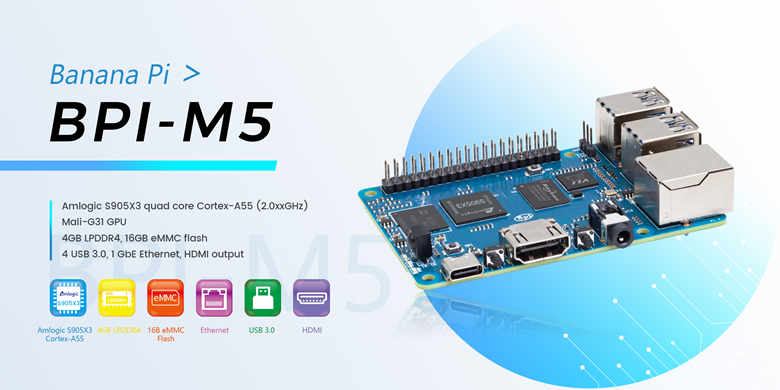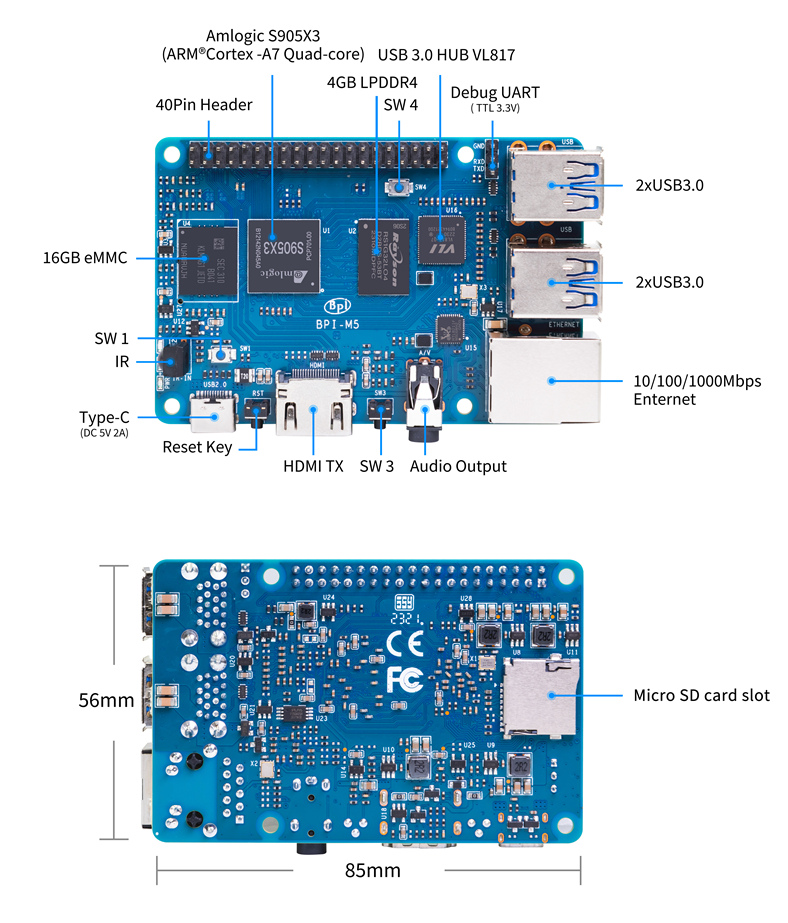Difference between revisions of "Banana Pi BPI-M4 Berry"
(→Introduction) |
|||
| Line 9: | Line 9: | ||
The BPI-M4 Berry development board stands as a powerful Single Board Computer (SBC), harnessing the capabilities of the Allwinner H618 System-on-Chip (SoC) to provide developers with impressive performance and a wealth of features. Similar to the Raspberry Pi 4b, the BPI-M4 Berry boasts comparable CPU prowess, LPDDR4 memory support, integrated WiFi and Bluetooth functionalities, and a familiar 40-pin header layout, alongside 4 USB interfaces and a GbE RJ45 port. | The BPI-M4 Berry development board stands as a powerful Single Board Computer (SBC), harnessing the capabilities of the Allwinner H618 System-on-Chip (SoC) to provide developers with impressive performance and a wealth of features. Similar to the Raspberry Pi 4b, the BPI-M4 Berry boasts comparable CPU prowess, LPDDR4 memory support, integrated WiFi and Bluetooth functionalities, and a familiar 40-pin header layout, alongside 4 USB interfaces and a GbE RJ45 port. | ||
| − | + | Characterized by its robust performance, versatile features, and remarkable image processing capabilities, stands as an exemplary SBC development platform for professionals within the embedded and computing industries. Equipped with 8GB eMMC flash storage, high-performance decoding and encoding capabilities, and an array of interface options, it caters to a wide spectrum of application domains, including media processing, IoT, and entertainment. Whether catering to novices or seasoned developers, the BPI-M4 Berry development board offers an ideal toolset for realizing creative visions and project objectives. | |
| − | |||
| − | |||
| − | |||
| − | |||
| − | |||
| − | |||
[[File:Banana_Pi_BPI-M5.jpg]] | [[File:Banana_Pi_BPI-M5.jpg]] | ||
Revision as of 18:19, 21 August 2023
Contents
BPI-M5 Introduction
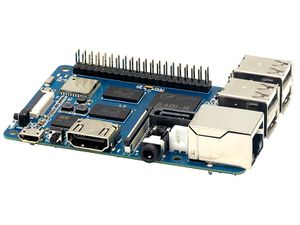
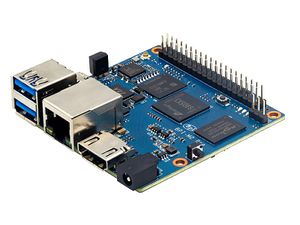
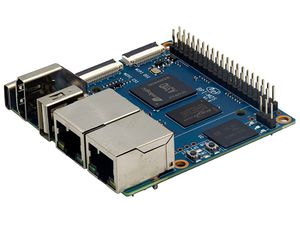
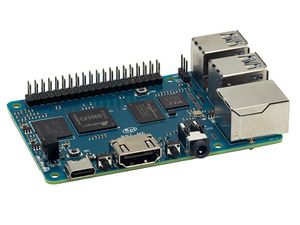
Introduction
The BPI-M4 Berry development board stands as a powerful Single Board Computer (SBC), harnessing the capabilities of the Allwinner H618 System-on-Chip (SoC) to provide developers with impressive performance and a wealth of features. Similar to the Raspberry Pi 4b, the BPI-M4 Berry boasts comparable CPU prowess, LPDDR4 memory support, integrated WiFi and Bluetooth functionalities, and a familiar 40-pin header layout, alongside 4 USB interfaces and a GbE RJ45 port.
Characterized by its robust performance, versatile features, and remarkable image processing capabilities, stands as an exemplary SBC development platform for professionals within the embedded and computing industries. Equipped with 8GB eMMC flash storage, high-performance decoding and encoding capabilities, and an array of interface options, it caters to a wide spectrum of application domains, including media processing, IoT, and entertainment. Whether catering to novices or seasoned developers, the BPI-M4 Berry development board offers an ideal toolset for realizing creative visions and project objectives.
Key Features
- Allwinner H618, Quad-core ARM Cortex™-A53 processor
- ARM Mali G31 GPU
- WIFI & Bluetooth
- 2G LPDDR4 RAM
- 8G eMMC flash memory
- 1x USB2.0 Type-C OTG, 5V power supply
- 4x USB2.0 Type-A
- 1x HDMI 2.0a
- 1x 3.5mm Audio & TVE jack socket
- 1x GbE Ethernet port
Getting Start
Hardware
Hardware interface
Hardware spec
| HardWare Specification of Banana pi BPI-M5 | |||
| CPU | Amlogic S905X3 64-bit Quad-Core Cortex-A55 (2.0xxGHz) | ||
| GPU | Mali-G31 MP2 GPU with 4 x Execution Engines (650Mhz) | ||
| Memory | 4 GB LPDDR4 | ||
| Storage | MicroSD slot with support for up to 256GB expansion and 16G eMMC flash with support for up to 64GB | ||
| Network | 10/100/1000 Mbit/s Ethernet ,Optional WiFi USB dongle | ||
| Video Output(s) | 1 x HDMI 2.1 (up to 4K@60Hz with HDR, CEC, EDID) | ||
| Audio Output(s) | 3.5mm jack and 1 x HDMI digital output | ||
| USB ports | USB 3.0 PORT (x4) | ||
| GPIO | 40 Pin Header : GPIO (x28) and Power (+5V, +3.3V and GND). GPIO pins can be used for UART, I2C, SPI or PWM | ||
| Switches | Reset, Power and U-boot | ||
| LED | Power Status and Activity status | ||
| Power Source | 5 volt @3A via Micro USB (TYPE C) | ||
| Size & Weight | 85x56 mm, 48g | ||
| OS | Android and Linux | ||
BPI-M2 Pro VS BPI-M5 VS Odroid C4 VS RPI 4
| BPI-M2 Pro VS BPI-M5 VS Odroid C4 VS RPI 4 | |||||
| Banana Pi BPI-M2 Pro | Banana Pi BPI-M5 | Odroid C4 | Raspberry Pi 4 | ||
| Processor | Amlogic S905X3 Quad-Core Cortex-A55 ARMv8.2-A 64-bit 1.5GHz | Amlogic S905X3 Quad-Core Cortex-A55 ARMv8.2-A 64-bit 1.5GHz | Amlogic S905X3 Quad-Core Cortex-A55 ARMv8.2-A 64-bit 1.5GHz | Broadcom BCM2711, Quad core Cortex-A72 (ARM v8) 64-bit SoC @ 1.5GHz | |
| GPU | Mali-G31 MP2 GPU | Mali-G31 MP2 GPU | Mali-G31 MP2 GPU | Broadcom VideoCore VI | |
| RAM | 2GB LPDDR4 | 4GB LPDDR4 | DDR4 4GiB with 32-bit bus width | 2GB, 4GB or 8GB LPDDR4-3200 SDRAM | |
| Storage | micro SD card slot & 16GB eMMC flash on board | micro SD card slot & 16GB eMMC flash on board | micro SD card slot , eMMC connector for option | micro SD card slot, non EMMC | |
| Network | 1 GbE ,WiFi&BT5.0 onbard | GbE ,Optional WiFi USB dongle | GbE | GbE, 2.4 GHz and 5.0 GHz IEEE 802.11ac wireless, Bluetooth 5.0, BLE | |
| Video Output | 1 x HDMI 2.1 (up to 4K@60Hz with HDR, CEC, EDID) | 1 x HDMI 2.1 (up to 4K@60Hz with HDR, CEC, EDID) | 1 x HDMI 2.1 (up to 4K@60Hz with HDR, CEC, EDID) | 2 × micro-HDMI 2.0 | |
| Audio Output | 1 x HDMI digital output | 3.5mm jack and 1 x HDMI digital output | Optional SPDIF optical output | 3.5 mm analogue audio-video jack | |
| DSI | N/A | N/A | N/A | 2-lane MIPI DSI display port | |
| CSI | N/A | N/A | N/A | 2-lane MIPI CSI camera port | |
| USB | USB 3.0 x 2 1 Micro USB 2.0 | USB 3.0 x 4 TYPE C | USB 3.0 x 4, 1 x Micro USB 2.0 port (OTG) | 2 USB 3.0 ports; 2 USB 2.0 ports; | |
| Power | 5 volt @3A via DC power | 5 volt @3A via Micro USB (TYPE C) | 1 x DC power jack (Outer diameter : 5.5mm, inner diameter : 2.1mm) | 5V DC via USB-C connector (minimum 3A*) | |
| IR | Yes | Yes | Yes | N/A | |
| GPIO | 40 Pin Header : GPIO (x28) and Power (+5V, +3.3V and GND). | 40 Pin Header : GPIO (x28) and Power (+5V, +3.3V and GND). | 40 x GPIO pins | 40-pin GPIO header, populated | |
| Button | Reset, user and U-boot | Reset, user and U-boot | N/A | N/A | |
| LED | Power Status and Activity status | Power Status and Activity status | Power Status and Activity status | Power Status and Activity status | |
| Dimensions & weight | 65mm x 65mm,58g | 85mm x 56mm, 48g | 85mm x 56mm 59g | 88 mm × 58 mm, 46 g | |
| System Support | Linux & Android | Linux & Android | Linux & Android | Linux & Android | |
GPIO PIN define
BPI-M5 40PIN GPIO (CON2)
| GPIO Pin Name | Default Function | Function2 | Function3 |
| CON1-P01 | VCC-3V3 | ||
| CON1-P02 | VCC5V | ||
| CON1-P03 | GPIOX_17 | I2C_M2_SDA | |
| CON1-P04 | VCC5V | ||
| CON1-P05 | GPIOX_18 | I2C_M2_SCL | |
| CON1-P06 | GND | ||
| CON1-P07 | GPIOX_5 SDIO_CMD | ||
| CON1-P08 | GPIOX_12 | UART_A_TX | |
| CON1-P09 | GND | ||
| CON1-P10 | GPIOX_13 | UART_A_RX | |
| CON1-P11 | GPIOX_3 SDIO_D3 | ||
| CON1-P12 | GPIOAO_8 | TDMB_SCLK | |
| CON1-P13 | GPIOX_4 SDIO_CLK | ||
| CON1-P14 | GND | ||
| CON1-P15 | GPIOX_7 PWM_F | ||
| CON1-P16 | GPIOX_0 SDIO_D0 | ||
| CON1-P17 | VCC-3V3 | ||
| CON1-P18 | GPIOX_1 SDIO_D1 | ||
| CON1-P19 | GPIOX_8 PCM_DIN | ||
| CON1-P20 | GND | ||
| CON1-P21 | GPIOX_9 PCM_DOUT | ||
| CON1-P22 | GPIOX_2 SDIO_D2 | ||
| CON1-P23 | GPIOX_11 | PCM_CLK | |
| CON1-P24 | GPIOX_10 | PCM_SYNC | |
| CON1-P25 | GND | ||
| CON1-P26 | GPIOX_16 | PWM_E | |
| CON1-P27 | GPIOA_14 | I2C_M3_SDA | |
| CON1-P28 | GPIOA_15 | I2C_M3_SCL | |
| CON1-P29 | GPIOX_14 | UART_A_CTS | |
| CON1-P30 | GND | ||
| CON1-P31 | GPIOX_15 | UART_A_RTS | |
| CON1-P32 | GPIOX_19 | PWM_B | |
| CON1-P33 | GPIOX_6 PWM_A | ||
| CON1-P34 | GND | ||
| CON1-P35 | GPIOAO_7 | TDMB_FS | |
| CON1-P36 | GPIOH_5 SPDIF_IN | ||
| CON1-P37 | GPIOAO_9 | I2S_MCLK | |
| CON1-P38 | GPIOAO_10 | TDMB_DIN | SPDIF_OUT |
| CON1-P39 | GND | ||
| CON1-P40 | GPIOAO_4 | TDMB_DOUT |
BPI-M5 Debug UART(CON1)
| CON2-P1 | GND |
| CON2-P2 | UART0-RX |
| CON2-P3 | UART0-TX |
